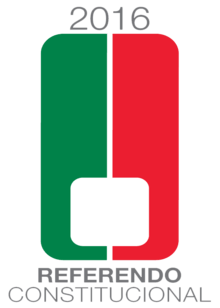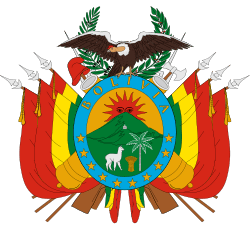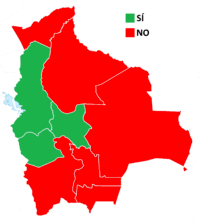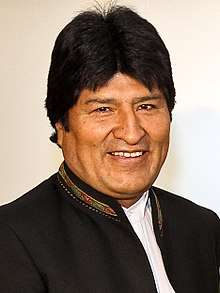Bolivian constitutional referendum, 2016

 |
|---|
| This article is part of a series on the politics and government of Bolivia |
|
Presidency |
A constitutional referendum was held in Bolivia on Sunday, 21 February 2016.[1] The proposed constitutional amendments would have allowed the president and vice president to run for a third consecutive term under the 2009 Constitution.[2] The referendum was voted down by a 51.3% majority.
Background

Article 168 of the 2009 constitution allows the President and Vice-President to put themselves forward for re-election only once, limiting the number of terms to two. The governing party, the Movement Towards Socialism–Political Instrument for the Sovereignty of the Peoples sponsored an effort to amend this article. The referendum was authorized by a combined session of the Plurinational Legislative Assembly on 26 September 2015, by a vote of 112 to 41.[3][4] Law 757, which convenes the February referendum, was passed 113 to 43, and was promulgated on 5 November 2015.[5]
Bolivian elections are conducted under an "act of good governance," which prohibits electoral propaganda in the days before an election, and tightly regulates motorized transport. It was illegal to buy or consume alcohol for 48 hours prior to the referendum to ensure voters took note of their decision.[2]
A successful 'yes' vote would have allowed President Evo Morales and Vice President Álvaro García Linera to run for another term in office in 2019. Morales had already been elected three times. The first time, in 2006, is not counted as it was before the two term limit was introduced by the 2009 constitution.[5]
Results

| Choice | Votes | % |
|---|---|---|
| For | 2,546,135 | 48.71 |
| Against | 2,682,517 | 51.29 |
| Invalid/blank votes | 262,267 | – |
| Total votes | 5,490,919 | 100 |
| Registered voters/turnout | 6,502,069 | 84.45 |
| Source: OEP | ||
Aftermath
Despite the referendum, the Supreme Tribunal of Justice of Bolivia ruled a little over one year later in December 2017 that all public offices would have no term limits despite what was established in the constitution, blaming American imperialism for the nullification of the referendum's decision, thus allowing Morales to run for a fourth term.[6]
References
- ↑ Bolivia Sets Date For Referendum On Evo Morales Re-election Telesurv, 15 October 2015
- 1 2 "Bolivia's Re-election Referendum: The case for Yes and No". Latin Correspondent. Retrieved 18 February 2016.
- ↑ La ALP sancionó la Ley de Reforma parcial de la CPE Archived 2015-12-26 at the Wayback Machine. Vice President of Bolivia
- ↑ Bolivia passes law to allow Morales to run for fourth term Reuters, 25 September 2015
- 1 2 Consulta para habilitar a Evo está en marcha; El MAS ‘se juega la vida’ La Razón, 6 November 2015
- ↑ Blair, Laurence (3 December 2017). "Evo for ever? Bolivia scraps term limits as critics blast 'coup' to keep Morales in power". The Guardian. Retrieved 1 January 2018.
This week, the country’s highest court overruled the constitution, scrapping term limits altogether for every office. Morales can now run for a fourth term in 2019 – and for every election thereafter. ... the referendum results – which the government claims were invalid due to an opposition smear campaign directed by Washington ...
